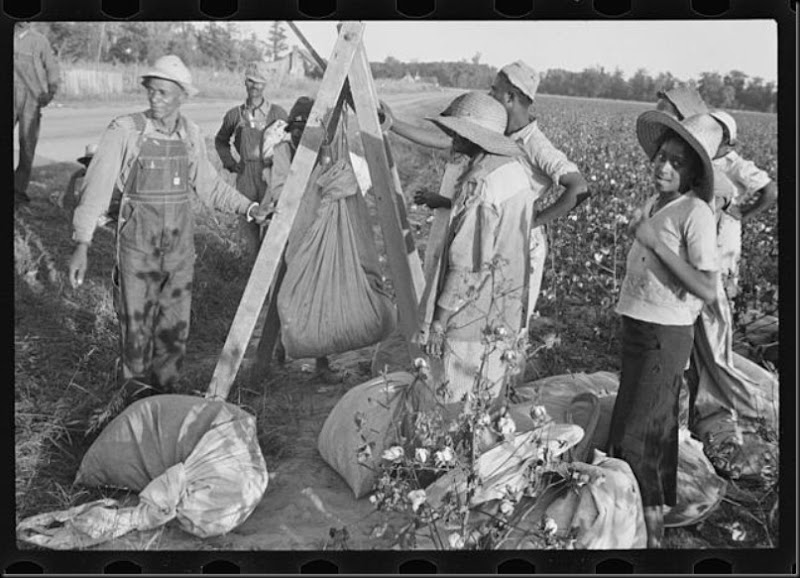Pulaski County, Arkansas, October 1935
Ben Shahn was born in Kaunus, Lithuania in 1898. He
emigrated to New York with his family in 1906. He became a lithographer's
apprentice after completing his schooling. He later attended both New York
University and the National Academy of Design from 1917 to 1921.
 Young cotton picker, Pulaski County, Arkansas. Schools for colored children do not open until January 1st so as not to interfere with cotton picking.
Young cotton picker, Pulaski County, Arkansas. Schools for colored children do not open until January 1st so as not to interfere with cotton picking.
In the 1920s Shahn became part of the social realism
movement. Social Realism is a term used to describe the works of American
artists during the Depression era who were devoted
to depicting the social troubles of the suffering urban lower class: urban
decay, labor strikes, and poverty. His early work was concerned with political
issues of the time, while his later work portrayed the loneliness of the city
dweller. Text and lettering formed an integral part of his designs and his work
was often inspired by news reports. After working in lithography until 1930,
his style crystallized in a series of 23 paintings concerning the
Sacco-Vanzetti trial. Shahn came to prominence in the 1930s as with "The
Passion of Sacco and Vanzetti". Shahn dealt consistently with social and
political themes. He developed a strong and brilliant sense of graphic design
revealed in numerous posters. His painting Vacant Lot (Wadsworth Atheneum,
Hartford, Conn.) exhibits a poetic realism, whereas his more abstract works are
characterized by terse, incisive lines and a lyric ic intensity of color. The
Blind Botanist (Wichita Art Mus.) is characteristic of his abstractions.
Shahn's murals include series for the Bronx Central Annex Post Office, New York
City.
From 1933 to 1938 he worked as a photographer for the
Farm Security Administration, producing masterful images of impoverished rural
areas and their inhabitants. Shahn used photographs throughout his career for
both composition and content. The photographer position at the FSA was a dream
job for Shahn because it provided him the opportunity to travel though
Depression-era America taking pictures. He later used those photographs for his
paintings years later. Critics in his time felt that using photographs for
paintings diminished the value of a painting. However, Shahn's work became the
most popular artist of his age. His work was on the cover of Time and well as
the Museum of Modern Art.
Shahn has been described as a man of uncompromising
beliefs and an artist who spoke to the world. Shahn continuously adopted new
themes and mediums to define the human condition of his time. Active until the
end of his career, Shahn was also a distinguished lecturer, teacher, and
writer.
All images © Ben Shahn















Nessun commento:
Posta un commento